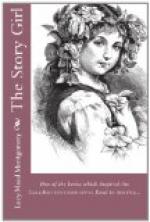“I’m going to put two cents more a week in my missionary box than I’ve been doing,” said Cecily determinedly.
Two cents more a week out of Cecily’s egg money, meant something of a sacrifice. It inspired the rest of us. We all decided to increase our weekly contribution by a cent or so. And Peter, who had had no missionary box at all, up to this time, determined to start one.
“I don’t seem to be able to feel as int’rested in missionaries as you folks do,” he said, “but maybe if I begin to give something I’ll get int’rested. I’ll want to know how my money’s being spent. I won’t be able to give much. When your father’s run away, and your mother goes out washing, and you’re only old enough to get fifty cents a week, you can’t give much to the heathen. But I’ll do the best I can. My Aunt Jane was fond of missions. Are there any Methodist heathen? I s’pose I ought to give my box to them, rather than to Presbyterian heathen.”
“No, it’s only after they’re converted that they’re anything in particular,” said Felicity. “Before that, they’re just plain heathen. But if you want your money to go to a Methodist missionary you can give it to the Methodist minister at Markdale. I guess the Presbyterians can get along without it, and look after their own heathen.”
“Just smell Mrs. Sampson’s flowers,” said Cecily, as we passed a trim white paling close to the road, over which blew odours sweeter than the perfume of Araby’s shore. “Her roses are all out and that bed of Sweet William is a sight by daylight.”
“Sweet William is a dreadful name for a flower,” said the Story Girl. “William is a man’s name, and men are never sweet. They are a great many nice things, but they are not sweet and shouldn’t be. That is for women. Oh, look at the moonshine on the road in that gap between the spruces! I’d like a dress of moonshine, with stars for buttons.”
“It wouldn’t do,” said Felicity decidedly. “You could see through it.”
Which seemed to settle the question of moonshine dresses effectually.
CHAPTER XII. THE BLUE CHEST OF RACHEL WARD
“It’s utterly out of the question,” said Aunt Janet seriously. When Aunt Janet said seriously that anything was out of the question it meant that she was thinking about it, and would probably end up by doing it. If a thing really was out of the question she merely laughed and refused to discuss it at all.
The particular matter in or out of the question that opening day of August was a project which Uncle Edward had recently mooted. Uncle Edward’s youngest daughter was to be married; and Uncle Edward had written over, urging Uncle Alec, Aunt Janet and Aunt Olivia to go down to Halifax for the wedding and spend a week there.
Uncle Alec and Aunt Olivia were eager to go; but Aunt Janet at first declared it was impossible.




